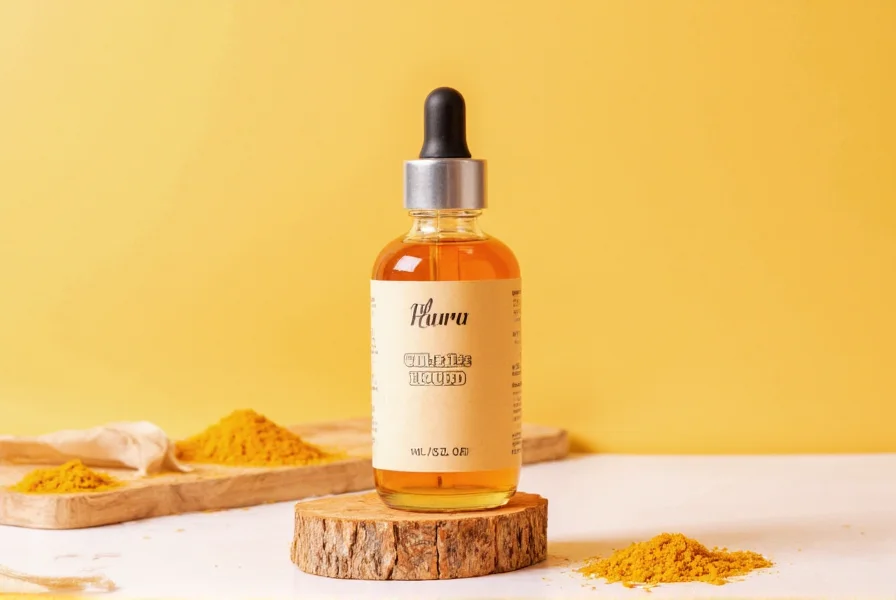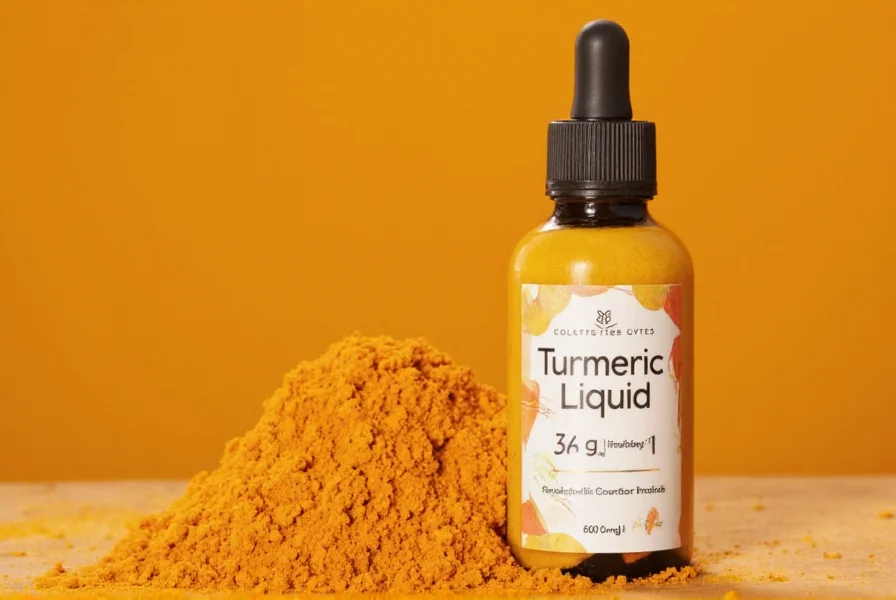Turmeric liquid represents a significant advancement in delivering the health benefits of curcumin, the primary active compound in turmeric root. While traditional turmeric powder contains only 2-8% curcumin by weight, liquid formulations concentrate this valuable compound while simultaneously addressing its notoriously poor bioavailability. The science behind effective turmeric liquid centers on overcoming curcumin's hydrophobic nature and rapid metabolism, which normally limit its absorption to less than 1% when consumed in raw or powdered form.
Understanding Turmeric Liquid Formulations
Liquid turmeric products come in several distinct formulations, each with different absorption characteristics:
| Formulation Type | Curcumin Concentration | Absorption Rate | Key Characteristics |
|---|---|---|---|
| Standard Liquid Extract | 5-10% | 2-3x powder | Alcohol-based extraction, moderate bioavailability |
| Liposomal Turmeric | 10-20% | 10-15x powder | Phospholipid encapsulation, enhanced cellular delivery |
| Nanoemulsified Liquid | 15-25% | 15-185x powder | Microscopic particle size, water-soluble, highest absorption |
| Suspension Formulas | 2-5% | 1-2x powder | Particles suspended in liquid, limited absorption benefit |
The most effective turmeric liquid absorption rate comes from nanoemulsified formulations, where curcumin particles are reduced to nanometer size and stabilized in a water-soluble delivery system. This technology transforms curcumin from fat-soluble to water-compatible, dramatically increasing its bioavailability without requiring black pepper extract (piperine) which is commonly added to capsule formulations.

Scientific Evidence for Health Benefits
Research published in the Journal of Medicinal Food demonstrates that high-bioavailability liquid turmeric formulations significantly increase curcumin levels in the bloodstream compared to standard supplements. A 2022 clinical trial found that participants using nanoemulsified turmeric liquid achieved blood curcumin concentrations 185 times higher than those consuming equivalent amounts of standard turmeric powder.
The enhanced absorption of liquid turmeric vs powder translates to measurable health benefits:
- Anti-inflammatory effects: A 2023 meta-analysis in Nutrients reported that high-bioavailability turmeric formulations reduced inflammatory markers like CRP by 32-47% in clinical populations
- Joint health: Research in the Journal of Ayurveda and Integrative Medicine showed significant improvement in pain scores and mobility for osteoarthritis patients using liquid turmeric compared to placebo
- Cognitive support: Studies indicate that only formulations achieving sufficient blood concentration show measurable effects on brain-derived neurotrophic factor (BDNF)
It's important to note that not all turmeric liquid benefits are equally supported by research. While evidence for anti-inflammatory effects is strong, claims about specific disease treatment often exceed current scientific validation.
Practical Usage Guidelines
When incorporating turmeric liquid into your routine, proper usage maximizes benefits while minimizing potential issues:
- Dosage: Most research uses 15-30mg of highly bioavailable curcumin daily. Check product labels for actual curcumin content, not just "turmeric extract" volume
- Timing: Take with food containing healthy fats to further enhance absorption, preferably at the same time each day
- Consistency: Benefits typically require 4-8 weeks of regular use for measurable effects
- Storage: Keep in a cool, dark place as light and heat degrade curcumin compounds
For those wondering how to use turmeric liquid effectively, adding it to smoothies, salad dressings, or warm (not hot) beverages preserves its active compounds better than cooking at high temperatures. Unlike capsules, liquid formulations allow for precise dosage adjustments based on individual needs and tolerance.

Safety Considerations and Potential Interactions
While generally well-tolerated, turmeric liquid side effects can occur, particularly at higher doses:
- Gastrointestinal discomfort (nausea, diarrhea) affects approximately 5% of users at doses exceeding 1,000mg curcumin daily
- May interact with blood-thinning medications due to mild anticoagulant properties
- Contraindicated for individuals with gallbladder issues or bile duct obstruction
- Pregnant women should consult healthcare providers before regular use
The risk of turmeric liquid side effects increases with formulations containing unnecessary additives or excessive concentrations. Quality products should list exact curcumin content and avoid artificial preservatives, colors, or sweeteners that could trigger sensitivities.
Choosing Quality Turmeric Liquid Products
With the market flooded with options, identifying effective turmeric liquid supplement products requires careful evaluation:
- Look for third-party testing verification from organizations like USP, NSF, or ConsumerLab
- Check for transparent labeling of actual curcumin content per serving
- Prefer products specifying their bioavailability technology (liposomal, nanoemulsion)
- Avoid products making exaggerated health claims that sound too good to be true
- Consider the ingredient list for unnecessary additives or allergens
Independent laboratory testing has revealed significant discrepancies between labeled and actual curcumin content in many products. Reputable manufacturers provide Certificates of Analysis verifying potency and purity, addressing common concerns about is liquid turmeric better than capsules by demonstrating actual bioavailability through testing data rather than marketing claims.
Comparing Turmeric Delivery Methods
When evaluating liquid turmeric vs capsules, consider these critical factors:
- Absorption efficiency: High-quality liquid formulations typically outperform standard capsules by 10-185x, though specialized capsule forms (like phytosome technology) can approach liquid absorption rates
- Dosage flexibility: Liquids allow for precise dose adjustments, beneficial for sensitive individuals or specific therapeutic protocols
- Cost effectiveness: While liquid products often have higher upfront costs, their superior absorption may provide better value per effective dose
- Convenience: Capsules offer portability and precise dosing without measuring, while liquids integrate more easily into foods and beverages
The question is liquid turmeric better than capsules doesn't have a universal answer—it depends on individual needs, absorption requirements, and lifestyle factors. For those with digestive issues that impair capsule absorption, liquid formulations often provide superior results. However, for travel or convenience, high-quality specialized capsules may serve better.
Frequently Asked Questions
How much turmeric liquid should I take daily?
Most research supports 15-30mg of bioavailable curcumin daily for general wellness. Since concentrations vary, check your product's actual curcumin content rather than volume. Start with the manufacturer's recommended dose and adjust based on tolerance. Higher therapeutic doses should be discussed with a healthcare provider.
Does turmeric liquid need to be taken with black pepper?
Advanced liquid formulations using nanoemulsion or liposomal technology don't require piperine (black pepper extract) because they've already solved the absorption problem. These technologies increase bioavailability 10-185 times without piperine. However, standard liquid extracts may still benefit from piperine addition.
How long does it take to feel benefits from turmeric liquid?
Most people notice subtle changes in inflammation and joint comfort within 2-4 weeks of consistent daily use. Significant improvements typically require 6-8 weeks as curcumin builds up in the system. Individual results vary based on health status, dosage, and the specific formulation's bioavailability.
Can I make turmeric liquid at home?
While you can create simple turmeric tinctures at home, achieving the high bioavailability of commercial nanoemulsified products isn't feasible without specialized equipment. Homemade versions typically have similar absorption to powdered turmeric. For therapeutic benefits, professionally formulated products with verified absorption technology are recommended.
Does turmeric liquid interact with medications?
Turmeric may interact with blood thinners, diabetes medications, and certain chemotherapy drugs. If you take prescription medications, consult your healthcare provider before starting any turmeric supplement. The risk increases with higher-bioavailability formulations as they deliver more active compound to your system.











 浙公网安备
33010002000092号
浙公网安备
33010002000092号 浙B2-20120091-4
浙B2-20120091-4